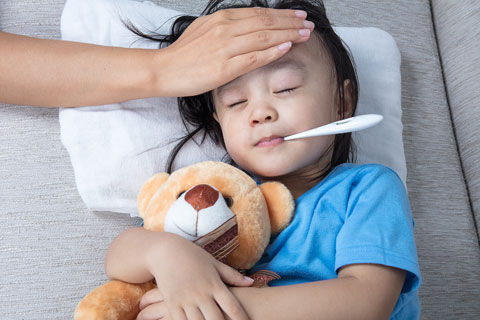Do you wonder if your child is too sick to go to preschool or child care? Here are some things to keep in mind.
Colds.
On average, a child catches 6–8 colds per year. If he is over 4 months old, there is no need to keep him home with sniffles or congestion—as long as his temperature is lower than 100 degrees and he has no other signs of illness.
Vomiting or diarrhea.
Keep your child home. Call the doctor if these problems persist or your child seems dehydrated. She can go back to child care when she can drink liquids without problems—at least 24 hours after the last time she vomits, and at least 12 hours after the last time she has diarrhea.
Stomachache, headache, earache, toothache.
Observe your child. If he is in severe pain, call his doctor immediately. If he doesn’t look or act sick, try gentle encouragement (like reminding him of something fun he will be doing that day). Call his doctor if he complains of pain frequently, his pain persists, or you’re unsure he is ill.
Conjunctivitis (“pinkeye”) or strep throat.
Your child should stay home until she has been on an antibiotic for 24 hours and has no fever. Red “bloodshot” eyes and yellow or greenish discharge from the eyes are signs that she should see a doctor. If she has a bad sore throat or a sore throat and a fever, she should be tested for strep at the doctor’s office.
Rash.
You don’t need to keep your child home for a minor diaper or heat rash. If he has an unusual rash with fever or acts unwell, see a doctor before sending him to child care or school. A child with impetigo (a skin infection characterized by blisters that itch) should stay home for 24 hours after starting to take antibiotics. Cover any remaining blisters or scaling with a bandage or dressing when he returns to child care.
Head lice.
Keep your child home until the morning after her first treatment. Some programs may ask you to keep her home longer. Note: Some treatments work better than others do, so check your child’s head thoroughly before sending her back to child care.
Chicken pox.
Keep your child home at least 6 days after the rash first appears.
Other general suggestions:
- Ask about your caregiver’s or program’s policies on sick children before enrolling your child. By law, Illinois child care providers must screen children for obvious signs of illness each day. State guidelines help these providers determine whether a child should be sent home. Some programs may be stricter than the state guidelines require.
- Plan ahead. You may need to stay home or find a relative or trusted friend who will stay with the child on short notice.
- In general, keep your child home if he is not well enough to take part in the usual class activities or might infect others. Ask your health care provider if you are unsure.
IEL Resource
- Resource List: Physical Health and Wellness


 PDF
PDF